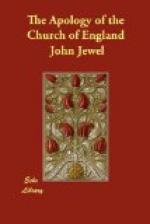But, say they, “ye have been of our fellowship, but now ye are become forsakers of your profession, and have departed from us.” It is true; we have departed from them, and for so doing we both give thanks to Almighty God, and greatly rejoice on our own behalf. But yet for all this, from the primitive Church, from the Apostles, and from Christ we have not departed. True it is, we were brought up with these men in darkness, and in the lack of the knowledge of God, as Moses was taught up in the learning and in the bosom of the Egyptians. “We have been of your company,” saith Tertullian, “I confess it, and no marvel at all; for,” saith he, “men be made and not born Christians.” But wherefore, I pray you, have they themselves, the citizens and dwellers of Rome, removed and come down from those seven hills, whereupon Rome sometime stood, to dwell rather in the plain called Mars’ field? they will say, peradventure, because the conduits of water, wherewithout men cannot commodiously live, have now failed and are dried up in those hills. Well, then, let them give us like leave in seeking the water of eternal life, that they give themselves in seeking the water of the well. For the water, verily, failed amongst them. “The elders of the Jews,” saith Jeremy, “sent their little ones to the waterings; and they finding no water, being in a miserable case, and utterly marred for thirst, brought home again their vessels empty.” “The needy and poor folk,” saith Esay, “sought about for water, but nowhere found they any; their tongue was even withered for thirst.” Even so these men have broken in pieces all the pipes and conduits: they have stopped up all the springs, and choked up the fountain of living water with dirt and mire. And as Caligula many years past locked up fast all the storehouses of corn in Rome, and thereby brought a general dearth and famine amongst the people; even so these men, by damming up all the fountains of God’s Word, have brought the people into a pitiful thirst. They have brought into the world, as saith the prophet Amos, “a hunger and a thirst: not the hunger of bread, nor the thirst of water, but of hearing the Word of God.” With great distress went they scattering about, seeking some spark of heavenly life to refresh their consciences withal: but that light was already thoroughly quenched out, so that they could find none. This was a rueful state; this was a lamentable form of God’s Church. It was a misery to live therein, without the Gospel, without light, and without all comfort.
Wherefore, though our departing were a trouble to them, yet ought they to consider withal how just cause we had of our departure. For if they will say, it is in nowise lawful for one to leave the fellowship wherein he hath been brought up, they may as well in our names, and upon our heads, condemn both the Prophets, the Apostles, and Christ Himself. For why complain they not also of this, that Lot went quite his way out of Sodom, Abraham out of Chaldea,




